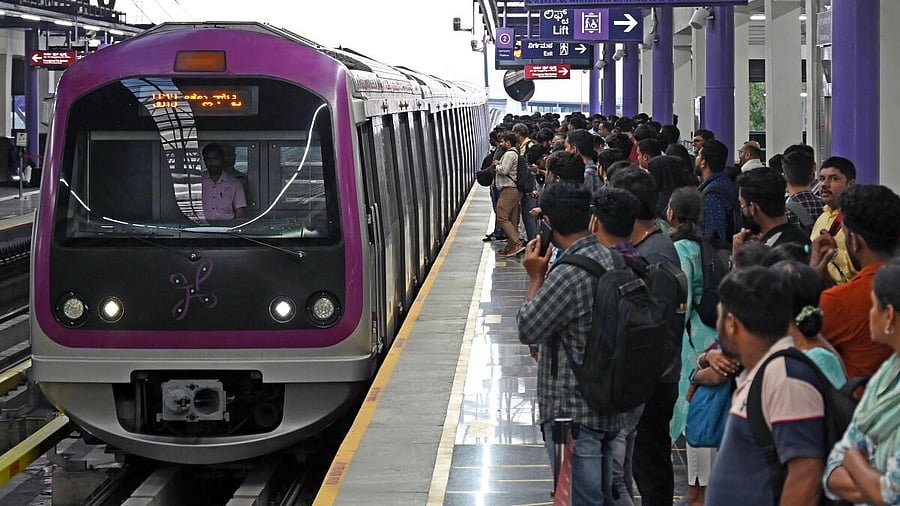
Representative image of people waiting for a metro in Bengaluru.
DH Photo/Pushkar V
Bengaluru: Responding to widespread passenger discontent, Namma Metro has announced a recalibration of its fare matrices, limiting the maximum hike to 71.43% from the earlier 100%.
The changes, announced at a packed press conference on Thursday, will come into effect from Friday and will benefit about three lakh passengers. Commuters will see their fares reduced by 15-30%, though the minimum and maximum fares will remain the same: Rs 10 and Rs 90. There will be no changes in fare slabs either.
Bangalore Metro Rail Corporation Limited (BMRCL) Managing Director M Maheshwar Rao announced the changes just hours after Chief Minister Siddaramaiah called for addressing the anomalies that had doubled fares on certain routes.
"I have asked the MD to urgently address these issues and reduce fares where increases are abnormal. Commuters' interests must be safeguarded," Siddaramaiah wrote on X.
Public backlash over the steep fare hike prompted the BMRCL board to hold back-to-back emergency meetings on Wednesday night and Thursday morning.
Rao attributed the abnormal increases to sudden jumps in fare zones. While Namma Metro will retain its 10 fare zones, commuters will now be charged based on the number of stations travelled. And the distance between two stations will be considered 1 km, regardless of the actual distance.
For example, the fare from MG Road to Baiyappanahalli (6.7 km) had doubled to Rs 40 from Rs 20 because it was placed in the fourth fare zone (6-8 km), even though the extra travel was just 0.7 km. After recalibration, the fare for this route will be Rs 30 because the destination is five stations away, and it falls in the third fare zone (4-6 km).
Out of the 4,624 fare matrices (spanning all fare combinations across the 68 stations), the BMRCL identified abnormal increases (70-100%) in 600-odd slabs. The hike was 100% in 15 fare matrices, 80-90% in 380 matrices and 70-80% in the rest.
No further changes in fares
Rao ruled out any further changes in the fares.
He explained that the recalibrations had been effected within the framework of the Fare Fixation Committee (FFC), whose recommendations are binding on the BMRCL under Section 37 of the Metro Railways (Operations and Maintenance) Act.
The committee, headed by Justice (retired) R Tharani, submitted its report on December 16. The BMRCL board of directors, headed by Secretary of the Ministry of Housing and Urban Affairs Srinivas Katikithala, accepted the report in toto on January 17.
The average fare hike before discounts is 51.55%. After discounts, it's 41.7% on weekdays and 39.87% on Sundays and three national holidays. The overall average hike after discounts is 46.39%. DH was the first to report the development.
Implemented on February 9, this was Namma Metro's first fare hike since June 2017.
Rao acknowledged that ridership had fallen by 8-10% on the first three weekdays after the fare hike. Ridership on February 11 was 8,28,149, as against the average of 8.8 lakh recorded on four Mondays this year. It was 7.78 lakh on February 12, as against 8.7 lakh. And on February 12, it fell to 7,62,811 from 8,67,660 recorded on February 5.
He, however, stressed that occupancy during peak hours remains 100% and dismissed comparisons with the Delhi metro, noting that fares in the capital were last revised eight years ago.
"Bengaluru metro has been making losses, and there is also depreciation (due to aging assets). Over the next three years, our debt repayment obligations will rise sharply," he said.
He explained that the BMRCL will have debt repayment obligations of Rs 10,422.2 crore until 2029-30 while its depreciation costs for the same period are projected at Rs 7,316.21 crore.
Rao also refuted suggestions that metro construction delays were due to the BMRCL's inefficiency. He said that the Yellow Line, which is ready but not operational for want of trains, was the "victim of certain circumstances". However, he agreed that the BMRLC needed to "complete our projects on time despite the challenges we face".